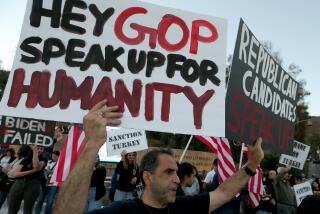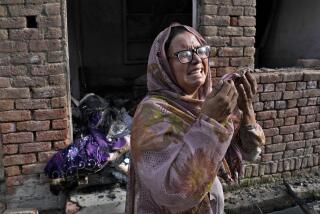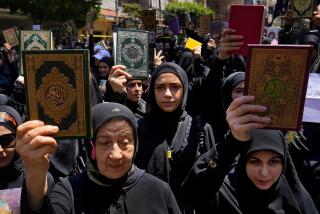Afghans protest rumored desecration of Koran by U.S. troops
- Share via
KABUL, AFGHANISTAN — Hundreds of angry protesters in Afghanistan’s capital burned an effigy of President Obama on Sunday, acting on rumors that American troops had desecrated the Koran.
U.S. military officials emphatically denied that any copies of the Muslim holy book had been mishandled, and they accused the Taliban of spreading falsehoods to incite hatred against Western forces.
The protest -- reminiscent of similar demonstrations in Iraq and elsewhere in the Muslim world in recent years -- showed how easily passions involving religious sensitivities can be stirred up even with a dearth of evidence.
The incident also pointed to a strong undercurrent of anti-American sentiment at a politically fraught time in Afghanistan, less than two weeks before a runoff to settle a divisive, fraud-tainted presidential election. The Nov. 7 face-off between President Hamid Karzai and former Foreign Minister Abdullah Abdullah was agreed to only after heavy U.S. pressure on Karzai to accept the results of an international audit. The investigators found that as many as one-third of the ballots cast for Karzai in the Aug. 20 election were fraudulent. That put the Afghan leader below the threshold of victory, 50%, and made a runoff necessary.
On Sunday morning U.S. political talk shows, both candidates ruled out a power-sharing agreement to avoid the runoff. Against this political backdrop, the Koran protest reflected a rising religious conservatism even among some members of Afghanistan’s educated elite, such as the university students who made up most of the crowd of about 1,000 demonstrators.
Police fired warning shots into the air when the demonstrators marched from Kabul University toward parliament, but no injuries were reported.
Several marchers insisted they were certain that a Koran had been desecrated by U.S. troops in Wardak province, just outside the capital, even if they could not provide particulars of the incident, such as when it was believed to have taken place.
“Muslims were disrespected!” said Zabiullah Khalil, an engineering student. “The foreigners shot the Koran, and then they burned it. They should be tried for this.”
The demonstration, like many in the capital, had a heartfelt yet orchestrated feel to it. Khalil, like a number of other participants, expressed broad anger at the United States in connection with the election and its disputed aftermath.
“We don’t want a slave government,” he said. “We want a real Islamic country.”
Larger grievances against the West also flared into the open. Law student Najibullah Hassanzadeh said he opposed an open-ended stay by foreign forces. “There should be conditions. They shouldn’t be staying here without any limits,” he said. “And the perpetrators of this action should be prosecuted and punished.”
The Western military coalition said the reports of desecration, which originated last week in Wardak after an American convoy hit a roadside bomb, were groundless. It said Afghan and Western officials had carried out a joint investigation before reaching their conclusion.
The statement shed no light on how the rumors had begun, or whether there had been an altercation with local people in the blast’s aftermath that could have given rise to a distorted version of the incident.
The North Atlantic Treaty Organization force said in a statement that it “condemns any behavior that disrespects Islam or the people of Afghanistan.”
Western officials enlisted the aid of the provincial governor and local religious authorities to try to quell the reports.
Sunday’s rally in the capital was the largest of what has been a wave of smaller protests elsewhere in the country over the alleged incident.
--
Special correspondent M. Karim Faiez contributed to this report.
More to Read
Sign up for Essential California
The most important California stories and recommendations in your inbox every morning.
You may occasionally receive promotional content from the Los Angeles Times.













